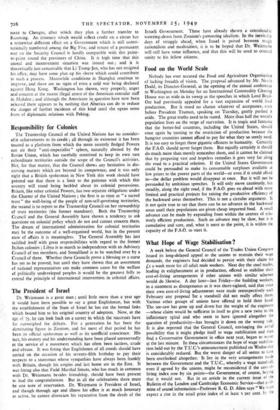Responsibility for Colonies
The Trusteeship Council of the United Nations has no consider- able achievements to its credit; all through its existence it has been treated as a platform from which the more recently fledged Powers can air their " anti-imperialist " spleen, naturally abetted by the Soviet Union, which has carefully contrived to keep its own vast subordinate territories outside the scope of the Council's activities. Not, for that matter, that the Council shows any hesitation in dis- cussing matters which are beyond its competence, and it was only right that a British spokesman in New York this week should have pointed out that there is a limit to the patience with which this country will stand being heckled about its colonial possessions. Britain, like other colonial Powers, has two separate obligations under the Charter of the United Nations ; the first is to treat as "a sacred trust" the well-being of the people of non-self-governing territories, the second is to report to the Trusteeship Council on her stewardship of trust territories (the former mandates). Both the Trusteeship Council and the General Assembly have shown a tendency to ask questions on colonial policy which do not and cannot concern them. The dream of international administration for colonial territories may be the outcome of a well-organised world, but in the present state of affairs it is meaningless. The General Assembly has just saddled itself with great responsibilities with regard to the former Italian colonies ; Libya is to march to independence with an Advisory Council of ten members, and Somaliland is to be watched over by a Council of three. Whether these Councils prove a blessing or a curse has yet to be proved, but until they have shown that an assortment of national representatives can make common cause for the welfare of politically undeveloped peoples it would be the greatest folly to extend the principle of international intervention in colonial affairs.






































 Previous page
Previous page